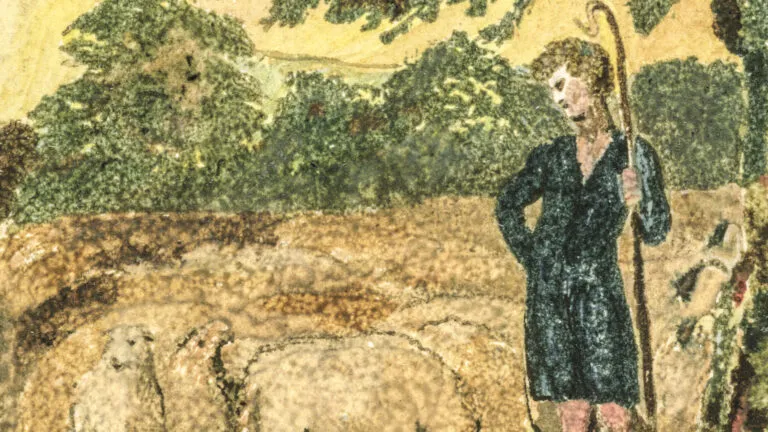The envelope immediately caught my attention as I opened the day’s mail. The stamp revealed it had been sent from a state prison. I’d been a pastor here at the Church of the Master for 22 years. Not many letters came to me from prisoners.
Curious, I opened it. A few postage stamps spilled out onto my desk. I pulled out the letter, handwritten on notebook paper. “I came to your church 14 years ago, asking for food and money,” it began. “I told the preacher my house had burned down, but that was a lie.”
I knew exactly who this was. How dare he write me after all these years! Had his conscience finally gotten the better of him? Or was he trying to pull some other con? He had no idea the pain his deceit had caused me and my wife, Jeannie. The anger had festered inside me ever since. I’d relived that day in my mind countless times.
It had been raining hard since early morning that Sunday, and there was a flood warning in effect. It was the kind of day when everyone avoided going out unless it was important. So when I met the man outside my office and heard his story of losing his home and needing assistance, it didn’t set off any alarm bells. He seemed as if he really needed my help. His clothes were drenched. The service had just ended, though I hadn’t seen him in the crowd. “Anything you can do, I’d be obliged,” he said. “It’s my little girl I’m most concerned about. If we just had some money for food…”
My heart went out to him. I had three young children myself. “I’ll ask the deacons to approve an emergency gift,” I told him. “But I’ll need to call them, then bring you the money.”
“I don’t know how to thank you,” the man said. He told me the name of the motel he and his family were staying in and the room number, then went to wait for me there. Jeannie had already gone home to prepare lunch, so I gave her a call to let her know what I was doing and that I’d be a bit late. Then I called the deacons to approve an emergency gift of $100 and picked up some sandwiches for the hungry family. By the time I met the man in front of his motel room, nearly 45 minutes had passed. I handed him the food and cash, along with my business card in case he wanted to reach me. I said goodbye and hurried to the car to drive home. I hoped Jeannie and the kids had eaten lunch without me.
When I pulled into the driveway, I was startled to see Jeannie sitting on the front porch, crying, completely soaked and streaked with mud. She held out her arms to me, and I ran to embrace her. “What happened?” I asked.
“I almost drowned,” she said, her words coming out in sobs. She went on to explain what had happened.
Near our house is a drainage ditch with a culvert that runs under a wide driveway before it empties out on the other side. When it rains, the ditch turns into a rushing stream. After I’d called, Jeannie had postponed lunch until my return. She went out onto the back porch to see if the drainage ditch was at risk of overflowing and noticed a little boy riding his bicycle in the street.
“Next thing I knew, he’d fallen into the ditch,” she said. “The water covered his head.”
“How awful!” I said, holding her close.
“I ran to him,” she continued. “I caught one of his hands and was able to pull him out, but then I fell in myself. I grabbed the top of the culvert, but the water was so strong, I could barely hold on. It was rushing over my face, and I couldn’t breathe. I thought I was going to die. Then I had this strong feeling that I should let go. All I could do was trust God to protect me. I relaxed my hands, and the water pulled me through the culvert, under the driveway, and out the other side. I was able to climb onto the grass. A neighbor was there to help me and to get the boy back to his family. Ted, I’m so glad you’re home!”
“Thank God you’re alive,” I said.
“And you saved the boy’s life! But I’m so sorry you went through that—it should’ve been me out there instead.”
“It’s okay,” Jeannie said. “You were helping someone too.”
She was right, and it was the only thing I clung to in the hours and days that followed, when I was racked with guilt for not being there for Jeannie.
The Indianapolis newspaper published a front-page photo and story of the rescue, calling Jeannie a hero. The Reverend Norman Vincent Peale even read it on his national radio show. I was so proud of Jeannie’s bravery, but she couldn’t forget the fear she’d felt. “I keep flashing back to my head under the water, to thinking I wouldn’t make it,” she said. “It was terrifying.”
I tried to console her, but my words did little to comfort her, which saddened me. I was her husband, and I wanted to be her protector.
A few days after the incident, I got a call from the manager of a pizza parlor. “I need you to pay your bill,” he said. “A man came in and ordered a pizza. He said he was your son and that you would come in to pay. He gave me your business card.”
My throat went dry. What a crook! What kind of person steals from a church? I felt foolish for being so gullible. I explained the situation to the manager, letting him know that, unfortunately, we’d both been conned. When I hung up, I was overcome with anger. Gone was the comfort of knowing I’d been absent for a good reason. This man’s lies had caused me to miss being there for Jeannie. It was why she had been the one to go in after the boy instead of me, why she’d nearly drowned and was so traumatized as a result. In my mind, I held the man responsible. I thought of him anytime someone came to the church asking for help. Every time there was a storm and I caught Jeannie nervously looking out the windows.
For 14 years, I had carried that guilt and anger inside of me, and now he was confessing. From prison, no less. I continued reading. “Please forgive me,” he wrote.
“I’m sending these stamps as a down payment on what I owe. I wish I could say why I picked out your church. It wasn’t personal. I’ve done a lot of bad things in my life. I’m sincerely sorry.”
Slowly I read the words again. It hit me that I really didn’t know this man at all. I didn’t understand the circumstances of his life. In my mind, I went over the details of that day again. How he was the reason I wasn’t there. Jeannie seeing the boy on the bike. Running to his rescue instead of me.
I should have been the one in her place. And yet…the reason Jeannie had gone out to the porch was because I wasn’t there. If I had been at home, the five of us would have all been having our lunch, sitting in the dining room, on the other side of the house. No one would have seen the boy. He almost surely would have drowned.
All those years I’d been so caught up in my anger at the man who’d lied to me that I’d been blind to the fact that our fateful encounter had allowed Jeannie to be right where God needed her to be. A tragedy was averted. Yes, it had been stressful for Jeannie. But the alternative? My plan? It would have been far worse.
The man asking my forgiveness knew nothing of this, of course. How God had used even his deceit for good. The bitterness I’d harbored toward him was gone, replaced by a grace I knew wasn’t my doing. I found a pen and writing pad.
“Dear sir,” I began. “Thank you for your letter. There’s something I’m long overdue in sharing with you….”





